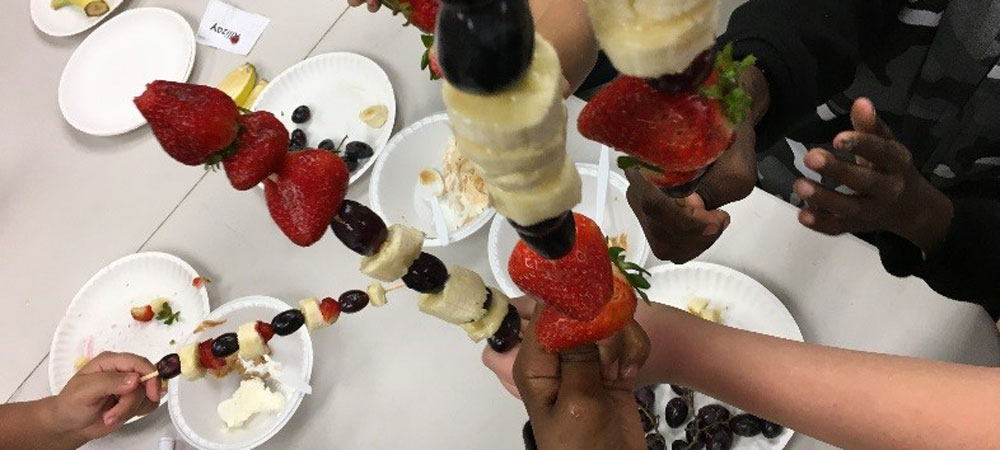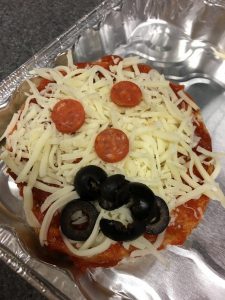
By Mylinh Nguyen, MOT
At the University Neighborhood Partners Hartland Partnership Center, two University of Utah-affiliated occupational therapy (OT) graduate interns, Mylinh Nguyen and Jegnasha Patel, led weekly cooking classes. The youth who participated in the cooking classes ranged from elementary to middle school age and came from diverse backgrounds. The cooking class was an opportunity for the youth to have some fun, learn about cooking, problem solving, relationship/team building, social skills, and life skills. Each cooking class was structured with the following sequence: rules, movement, meal preparation, cooking, reflection, and clean-up. As the weeks progressed, the youth really enjoyed cooking class and were eager to name the rules and lead the movement exercises which consisted of yoga poses.
 Both OT interns facilitated an environment that empowered the youth to participate and lead movement exercises. Prior to cooking, the youth were prompted to guess what meal was going to be prepared or what ingredients would be required, as a way to practice problem solving skills and work as a team. The environment and table were set up “family style.” Both OT interns wanted to set up an environment where the youth felt comfortable, could contribute to making the meals, and interact with one another. This setup encouraged the youth to take turns adding ingredients, stirring, creating the dish, and engaging with one another. A reinforcement system was used to promote positive behavior and participation. Many of the youth developed intrinsic motivation to assist in the set-up, passing out of materials/ingredients, and cleanup.
Both OT interns facilitated an environment that empowered the youth to participate and lead movement exercises. Prior to cooking, the youth were prompted to guess what meal was going to be prepared or what ingredients would be required, as a way to practice problem solving skills and work as a team. The environment and table were set up “family style.” Both OT interns wanted to set up an environment where the youth felt comfortable, could contribute to making the meals, and interact with one another. This setup encouraged the youth to take turns adding ingredients, stirring, creating the dish, and engaging with one another. A reinforcement system was used to promote positive behavior and participation. Many of the youth developed intrinsic motivation to assist in the set-up, passing out of materials/ingredients, and cleanup.
The meals were prepared with minimal ingredient recipes that could be prepared with or without a microwave or convection oven. This was because the OT interns wanted the youth to be able to make the food at home if they desired. After cooking sessions, the youth had the opportunity to eat what they created. Many of their faces lit up with a sense of accomplishment and joy as they looked at their finished product. They ate as a group and had time to chat and talk about their day with one another.
The cooking class concluded with the youth taking turns reflecting as a group on healthy ingredients and nutritional benefits of the meal. This reflection time allowed the youth to pause, think about the cooking process and what they consumed, and simply spend time engaging and interacting with one another. Reflection often carried over to conversations about how much they enjoyed the cooking process. Creativity was also facilitated as the youth generated ideas about how to modify the recipe and what could be cooked in the future. Each individual was responsible for cleaning up his/her own space. Over the weeks, many of the youth volunteered to complete additional cleaning tasks and went above and beyond with what they were responsible for. The lifelong skills they gained in cooking class are easily transferable and applicable to other areas in their lives, and will help promote their further success.
